Analyzing Effectuation and Traditional Entrepreneurship Principles
VerifiedAdded on 2023/01/13
|6
|1270
|23
Essay
AI Summary
This essay examines the contrasting perspectives of traditional and effectuation entrepreneurship. It begins by outlining the core differences, highlighting the traditional focus on pre-planned strategies and risk management versus the effectuation approach, which emphasizes utilizing available resources and adapting to changing circumstances. The main body of the essay then delves into the five key principles of effectuation: Bird in Hand, Affordable Loss, Crazy Quilt, Lemonade, and Pilot in the Plane. Each principle is thoroughly described, emphasizing its importance for entrepreneurial success. The essay concludes by summarizing the key differences and reinforcing the significance of the effectuation principles for aspiring entrepreneurs seeking to establish successful businesses. The essay underscores the shift from a predictive to a more adaptive and collaborative approach to business creation.

Principles of Innovation
and Entrepreneurship
and Entrepreneurship
Paraphrase This Document
Need a fresh take? Get an instant paraphrase of this document with our AI Paraphraser
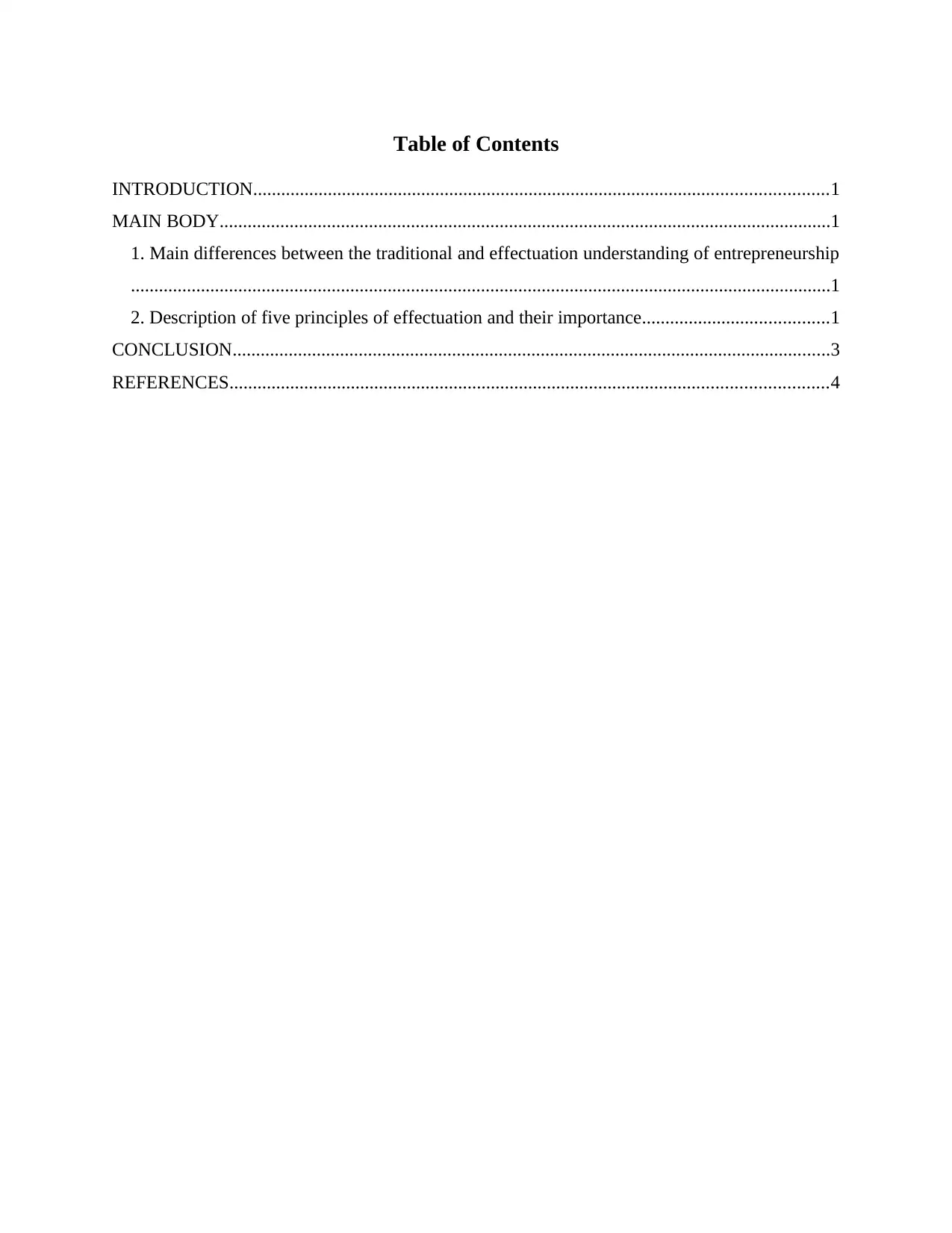
Table of Contents
INTRODUCTION...........................................................................................................................1
MAIN BODY...................................................................................................................................1
1. Main differences between the traditional and effectuation understanding of entrepreneurship
......................................................................................................................................................1
2. Description of five principles of effectuation and their importance........................................1
CONCLUSION................................................................................................................................3
REFERENCES................................................................................................................................4
INTRODUCTION...........................................................................................................................1
MAIN BODY...................................................................................................................................1
1. Main differences between the traditional and effectuation understanding of entrepreneurship
......................................................................................................................................................1
2. Description of five principles of effectuation and their importance........................................1
CONCLUSION................................................................................................................................3
REFERENCES................................................................................................................................4
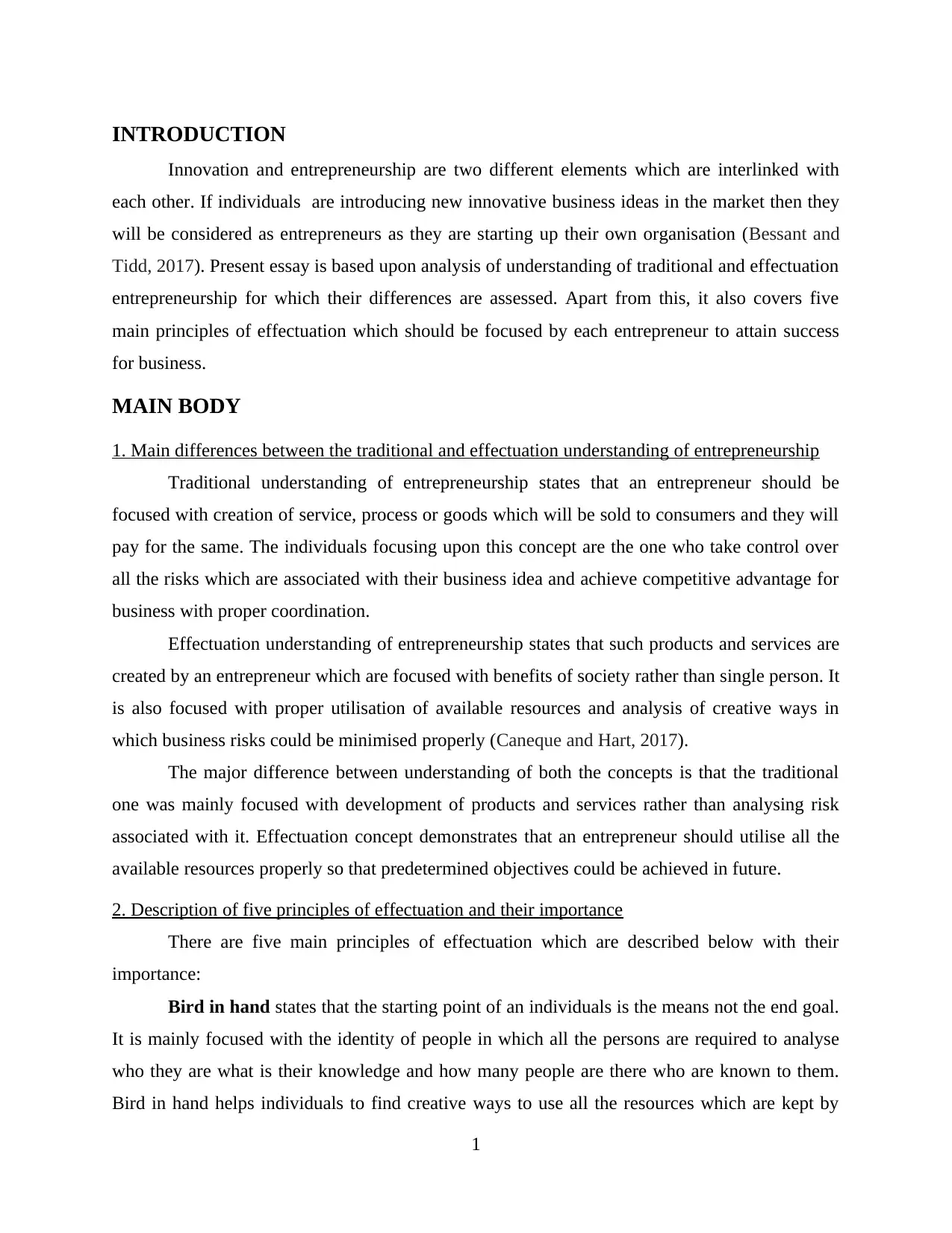
INTRODUCTION
Innovation and entrepreneurship are two different elements which are interlinked with
each other. If individuals are introducing new innovative business ideas in the market then they
will be considered as entrepreneurs as they are starting up their own organisation (Bessant and
Tidd, 2017). Present essay is based upon analysis of understanding of traditional and effectuation
entrepreneurship for which their differences are assessed. Apart from this, it also covers five
main principles of effectuation which should be focused by each entrepreneur to attain success
for business.
MAIN BODY
1. Main differences between the traditional and effectuation understanding of entrepreneurship
Traditional understanding of entrepreneurship states that an entrepreneur should be
focused with creation of service, process or goods which will be sold to consumers and they will
pay for the same. The individuals focusing upon this concept are the one who take control over
all the risks which are associated with their business idea and achieve competitive advantage for
business with proper coordination.
Effectuation understanding of entrepreneurship states that such products and services are
created by an entrepreneur which are focused with benefits of society rather than single person. It
is also focused with proper utilisation of available resources and analysis of creative ways in
which business risks could be minimised properly (Caneque and Hart, 2017).
The major difference between understanding of both the concepts is that the traditional
one was mainly focused with development of products and services rather than analysing risk
associated with it. Effectuation concept demonstrates that an entrepreneur should utilise all the
available resources properly so that predetermined objectives could be achieved in future.
2. Description of five principles of effectuation and their importance
There are five main principles of effectuation which are described below with their
importance:
Bird in hand states that the starting point of an individuals is the means not the end goal.
It is mainly focused with the identity of people in which all the persons are required to analyse
who they are what is their knowledge and how many people are there who are known to them.
Bird in hand helps individuals to find creative ways to use all the resources which are kept by
1
Innovation and entrepreneurship are two different elements which are interlinked with
each other. If individuals are introducing new innovative business ideas in the market then they
will be considered as entrepreneurs as they are starting up their own organisation (Bessant and
Tidd, 2017). Present essay is based upon analysis of understanding of traditional and effectuation
entrepreneurship for which their differences are assessed. Apart from this, it also covers five
main principles of effectuation which should be focused by each entrepreneur to attain success
for business.
MAIN BODY
1. Main differences between the traditional and effectuation understanding of entrepreneurship
Traditional understanding of entrepreneurship states that an entrepreneur should be
focused with creation of service, process or goods which will be sold to consumers and they will
pay for the same. The individuals focusing upon this concept are the one who take control over
all the risks which are associated with their business idea and achieve competitive advantage for
business with proper coordination.
Effectuation understanding of entrepreneurship states that such products and services are
created by an entrepreneur which are focused with benefits of society rather than single person. It
is also focused with proper utilisation of available resources and analysis of creative ways in
which business risks could be minimised properly (Caneque and Hart, 2017).
The major difference between understanding of both the concepts is that the traditional
one was mainly focused with development of products and services rather than analysing risk
associated with it. Effectuation concept demonstrates that an entrepreneur should utilise all the
available resources properly so that predetermined objectives could be achieved in future.
2. Description of five principles of effectuation and their importance
There are five main principles of effectuation which are described below with their
importance:
Bird in hand states that the starting point of an individuals is the means not the end goal.
It is mainly focused with the identity of people in which all the persons are required to analyse
who they are what is their knowledge and how many people are there who are known to them.
Bird in hand helps individuals to find creative ways to use all the resources which are kept by
1
⊘ This is a preview!⊘
Do you want full access?
Subscribe today to unlock all pages.

Trusted by 1+ million students worldwide
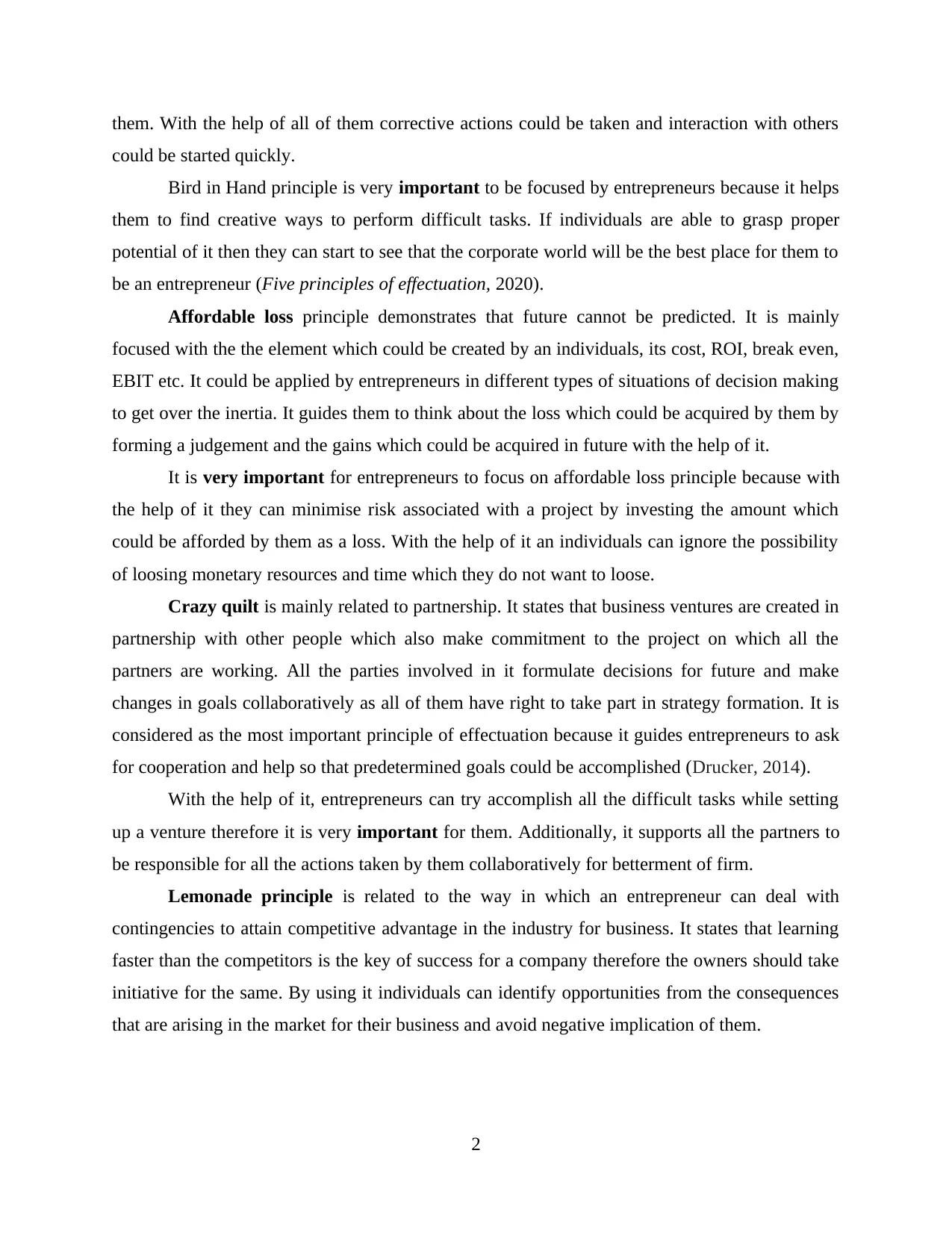
them. With the help of all of them corrective actions could be taken and interaction with others
could be started quickly.
Bird in Hand principle is very important to be focused by entrepreneurs because it helps
them to find creative ways to perform difficult tasks. If individuals are able to grasp proper
potential of it then they can start to see that the corporate world will be the best place for them to
be an entrepreneur (Five principles of effectuation, 2020).
Affordable loss principle demonstrates that future cannot be predicted. It is mainly
focused with the the element which could be created by an individuals, its cost, ROI, break even,
EBIT etc. It could be applied by entrepreneurs in different types of situations of decision making
to get over the inertia. It guides them to think about the loss which could be acquired by them by
forming a judgement and the gains which could be acquired in future with the help of it.
It is very important for entrepreneurs to focus on affordable loss principle because with
the help of it they can minimise risk associated with a project by investing the amount which
could be afforded by them as a loss. With the help of it an individuals can ignore the possibility
of loosing monetary resources and time which they do not want to loose.
Crazy quilt is mainly related to partnership. It states that business ventures are created in
partnership with other people which also make commitment to the project on which all the
partners are working. All the parties involved in it formulate decisions for future and make
changes in goals collaboratively as all of them have right to take part in strategy formation. It is
considered as the most important principle of effectuation because it guides entrepreneurs to ask
for cooperation and help so that predetermined goals could be accomplished (Drucker, 2014).
With the help of it, entrepreneurs can try accomplish all the difficult tasks while setting
up a venture therefore it is very important for them. Additionally, it supports all the partners to
be responsible for all the actions taken by them collaboratively for betterment of firm.
Lemonade principle is related to the way in which an entrepreneur can deal with
contingencies to attain competitive advantage in the industry for business. It states that learning
faster than the competitors is the key of success for a company therefore the owners should take
initiative for the same. By using it individuals can identify opportunities from the consequences
that are arising in the market for their business and avoid negative implication of them.
2
could be started quickly.
Bird in Hand principle is very important to be focused by entrepreneurs because it helps
them to find creative ways to perform difficult tasks. If individuals are able to grasp proper
potential of it then they can start to see that the corporate world will be the best place for them to
be an entrepreneur (Five principles of effectuation, 2020).
Affordable loss principle demonstrates that future cannot be predicted. It is mainly
focused with the the element which could be created by an individuals, its cost, ROI, break even,
EBIT etc. It could be applied by entrepreneurs in different types of situations of decision making
to get over the inertia. It guides them to think about the loss which could be acquired by them by
forming a judgement and the gains which could be acquired in future with the help of it.
It is very important for entrepreneurs to focus on affordable loss principle because with
the help of it they can minimise risk associated with a project by investing the amount which
could be afforded by them as a loss. With the help of it an individuals can ignore the possibility
of loosing monetary resources and time which they do not want to loose.
Crazy quilt is mainly related to partnership. It states that business ventures are created in
partnership with other people which also make commitment to the project on which all the
partners are working. All the parties involved in it formulate decisions for future and make
changes in goals collaboratively as all of them have right to take part in strategy formation. It is
considered as the most important principle of effectuation because it guides entrepreneurs to ask
for cooperation and help so that predetermined goals could be accomplished (Drucker, 2014).
With the help of it, entrepreneurs can try accomplish all the difficult tasks while setting
up a venture therefore it is very important for them. Additionally, it supports all the partners to
be responsible for all the actions taken by them collaboratively for betterment of firm.
Lemonade principle is related to the way in which an entrepreneur can deal with
contingencies to attain competitive advantage in the industry for business. It states that learning
faster than the competitors is the key of success for a company therefore the owners should take
initiative for the same. By using it individuals can identify opportunities from the consequences
that are arising in the market for their business and avoid negative implication of them.
2
Paraphrase This Document
Need a fresh take? Get an instant paraphrase of this document with our AI Paraphraser
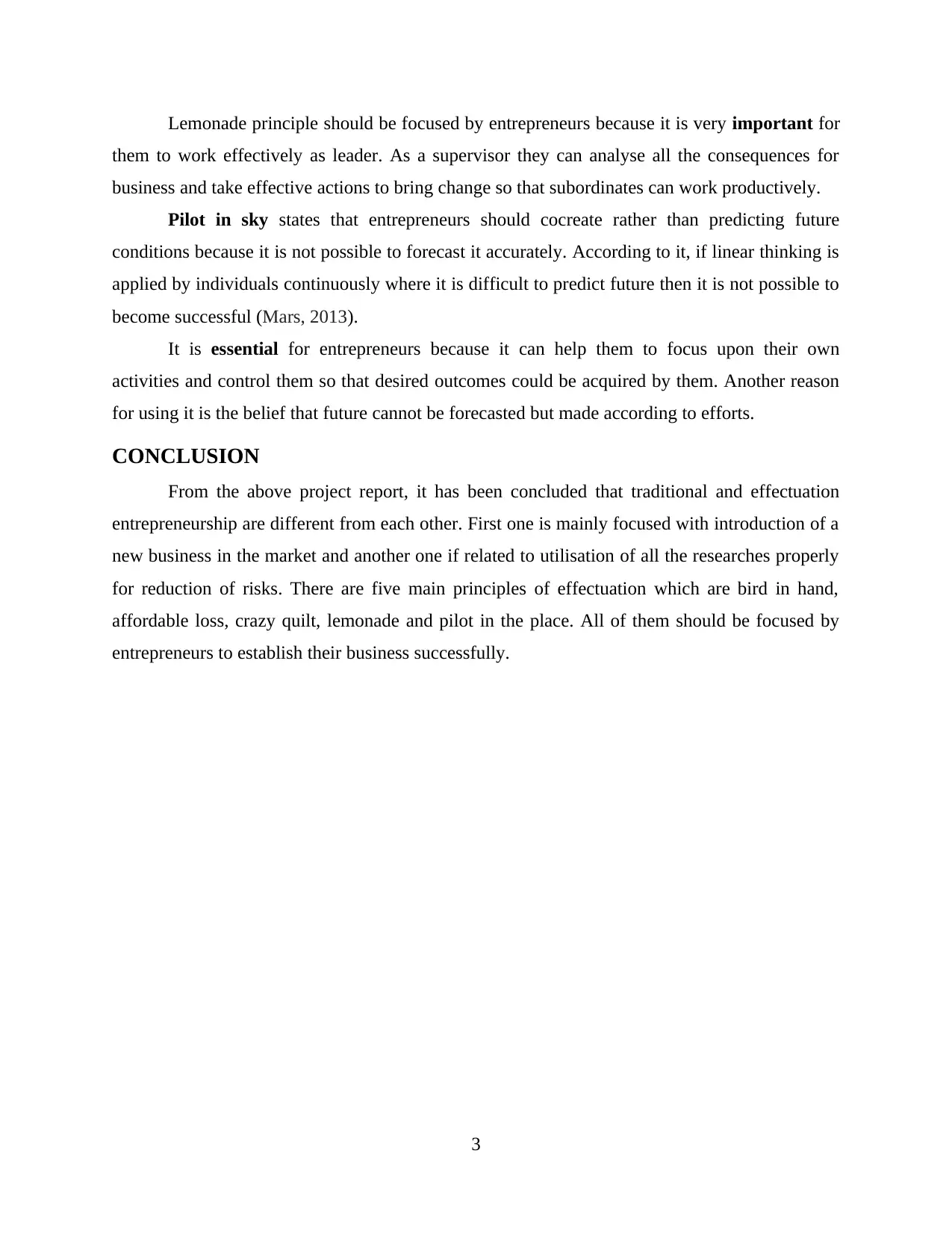
Lemonade principle should be focused by entrepreneurs because it is very important for
them to work effectively as leader. As a supervisor they can analyse all the consequences for
business and take effective actions to bring change so that subordinates can work productively.
Pilot in sky states that entrepreneurs should cocreate rather than predicting future
conditions because it is not possible to forecast it accurately. According to it, if linear thinking is
applied by individuals continuously where it is difficult to predict future then it is not possible to
become successful (Mars, 2013).
It is essential for entrepreneurs because it can help them to focus upon their own
activities and control them so that desired outcomes could be acquired by them. Another reason
for using it is the belief that future cannot be forecasted but made according to efforts.
CONCLUSION
From the above project report, it has been concluded that traditional and effectuation
entrepreneurship are different from each other. First one is mainly focused with introduction of a
new business in the market and another one if related to utilisation of all the researches properly
for reduction of risks. There are five main principles of effectuation which are bird in hand,
affordable loss, crazy quilt, lemonade and pilot in the place. All of them should be focused by
entrepreneurs to establish their business successfully.
3
them to work effectively as leader. As a supervisor they can analyse all the consequences for
business and take effective actions to bring change so that subordinates can work productively.
Pilot in sky states that entrepreneurs should cocreate rather than predicting future
conditions because it is not possible to forecast it accurately. According to it, if linear thinking is
applied by individuals continuously where it is difficult to predict future then it is not possible to
become successful (Mars, 2013).
It is essential for entrepreneurs because it can help them to focus upon their own
activities and control them so that desired outcomes could be acquired by them. Another reason
for using it is the belief that future cannot be forecasted but made according to efforts.
CONCLUSION
From the above project report, it has been concluded that traditional and effectuation
entrepreneurship are different from each other. First one is mainly focused with introduction of a
new business in the market and another one if related to utilisation of all the researches properly
for reduction of risks. There are five main principles of effectuation which are bird in hand,
affordable loss, crazy quilt, lemonade and pilot in the place. All of them should be focused by
entrepreneurs to establish their business successfully.
3
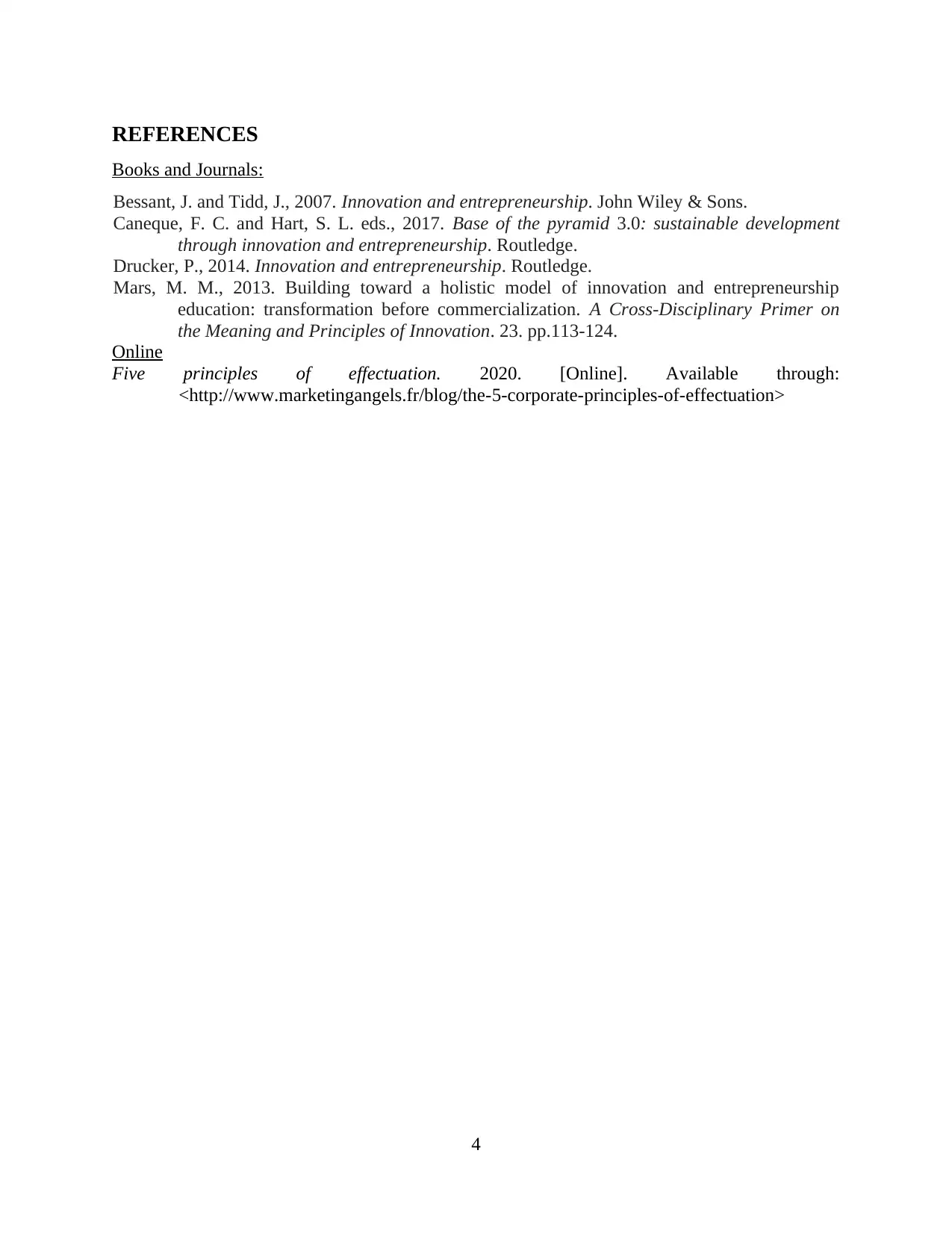
REFERENCES
Books and Journals:
Bessant, J. and Tidd, J., 2007. Innovation and entrepreneurship. John Wiley & Sons.
Caneque, F. C. and Hart, S. L. eds., 2017. Base of the pyramid 3.0: sustainable development
through innovation and entrepreneurship. Routledge.
Drucker, P., 2014. Innovation and entrepreneurship. Routledge.
Mars, M. M., 2013. Building toward a holistic model of innovation and entrepreneurship
education: transformation before commercialization. A Cross-Disciplinary Primer on
the Meaning and Principles of Innovation. 23. pp.113-124.
Online
Five principles of effectuation. 2020. [Online]. Available through:
<http://www.marketingangels.fr/blog/the-5-corporate-principles-of-effectuation>
4
Books and Journals:
Bessant, J. and Tidd, J., 2007. Innovation and entrepreneurship. John Wiley & Sons.
Caneque, F. C. and Hart, S. L. eds., 2017. Base of the pyramid 3.0: sustainable development
through innovation and entrepreneurship. Routledge.
Drucker, P., 2014. Innovation and entrepreneurship. Routledge.
Mars, M. M., 2013. Building toward a holistic model of innovation and entrepreneurship
education: transformation before commercialization. A Cross-Disciplinary Primer on
the Meaning and Principles of Innovation. 23. pp.113-124.
Online
Five principles of effectuation. 2020. [Online]. Available through:
<http://www.marketingangels.fr/blog/the-5-corporate-principles-of-effectuation>
4
⊘ This is a preview!⊘
Do you want full access?
Subscribe today to unlock all pages.

Trusted by 1+ million students worldwide
1 out of 6
Related Documents
Your All-in-One AI-Powered Toolkit for Academic Success.
+13062052269
info@desklib.com
Available 24*7 on WhatsApp / Email
![[object Object]](/_next/static/media/star-bottom.7253800d.svg)
Unlock your academic potential
Copyright © 2020–2026 A2Z Services. All Rights Reserved. Developed and managed by ZUCOL.



